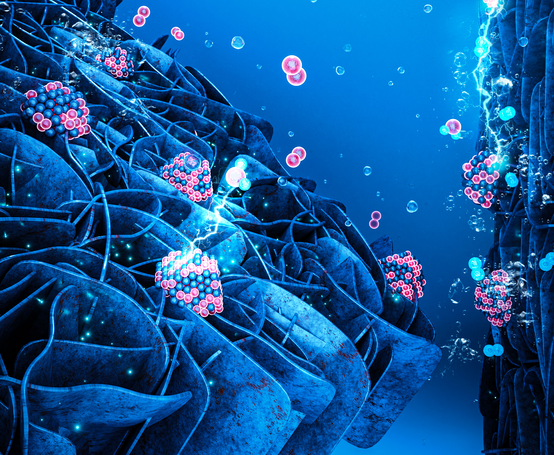Researchers from Saudi Arabia's King Abdullah University of Science and Technology (KAUST) have shown that a metal foam could underpin a low-cost method of generating carbon-free hydrogen. “Using a simple, rapid and scalable wet-chemical approach, the team grew two-dimensional cobalt iron hydroxide (CoFe-OH) nanosheets on nickel foam substrates, then deposited iron oxyhydroxide (FeOOH) nanoparticles onto the surface. By using nanomaterial deposition to engineer the interface between the electrode and the water, the team created a material that combined high electrical conductivity with a high surface area covered with abundant active sites for molecular oxygen (O2) production. The material also proved to be robust, with no drop-off in performance detected after 50 hours of continuous use,” the researchers wrote on Thursday, adding that this could present an opportunity to avoid the use of electrodes made from rare and expensive metals.
Norwegian fuel cell producer Nel ASA is ready to increase its electrolyzer production capacity to meet the European Union's raised ambitions for renewable hydrogen “Our brand-new and fully automated electrolyzer manufacturing facility at Herøya is already producing at three shifts. We are reaching new production records every week and will start a site selection process for additional production capacity in Europe,” commented Nel CEO Jon André Løkke. Nel's electrolyzer plant at Herøya can reportedly provide 500 MW of capacity to the market with the possibility to expand up to 2 GW.
Kuala Lumpur-based Petronas Hydrogen (PH2SB) and Japanese petroleum company Eneos have signed a joint feasibility study agreement (JFSA) to advance the studies for commercial hydrogen production and conversion project in Kerteh, Terengganu. “Under the JFSA, both parties will pursue detailed technical and commercial feasibility studies for the production of low carbon hydrogen from Petronas' existing facilities, production of green hydrogen from a new hydro-powered electrolyzer facility, and hydrogen conversion into methylcyclohexane (MCH). The agreement is part of the long-term memorandum of understanding (MoU) signed last August for the development of a clean hydrogen supply chain between Malaysia and Japan,” Petronas wrote on Friday.
State-owned energy company Israel Electric and United Arab Emirates-based sustainable investment company Energroup inked a preliminary deal to develop blue and green hydrogen generation last week, Israel Electric confirmed to pv magazine. The two companies will jointly develop and operate green and blue hydrogen projects.
The UAE is flexing its hydrogen muscles, and not only in the Middle East. On Sunday and Monday, Austria's Federal Chancellor Karl Nehammer visited the United Arab Emirates and Qatar to reduce dependence on Russian natural gas in the medium to long term. “Green hydrogen from the United Arab Emirates could be an alternative,” the office of the chancellor wrote on Monday. During the talks, Austrian Federal Minister Elisabeth Köstinger signed a corresponding declaration of intent on the Austrian-Emirati hydrogen alliance with the UAE's minister of industry, Sultan Bin Ahmad Sultan Al Jaber. The Austrian government spoke about green hydrogen as a possible solution in the medium to long term.
On Thursday, the governors of Louisiana, Oklahoma, and Arkansas announced that their states have entered into a three-state partnership to establish a regional hub for development, production, and use of clean hydrogen as fuel and manufacturing feedstock. “These states are perfectly situated to demonstrate the entire value chain of hydrogen and uniquely situated to tackle the hard-to-decarbonize sectors like industrial, manufacturing, and transportation. The partnership builds upon existing advantages, such as an inland seaport system that runs from Oklahoma through Arkansas and down the Mississippi River to the Gulf of Mexico in Louisiana, existing intermodal rail, existing pipeline infrastructure that runs from Oklahoma through Arkansas to the Gulf of Mexico, and some of the most valuable interstate freight highways in the United States,” reads a note published by the government of Louisiana.
On Tuesday, the European Commission unveiled its plan to make Europe independent from Russian fossil fuels well before 2030. “The quicker we switch to renewables and hydrogen, combined with more energy efficiency, the quicker we will be truly independent and master our energy system,” Commission President Ursula von der Leyen commented. The EU will focus on renewable hydrogen production and imports. Two weeks ago, the EU said that it would provide €300.5 million as part of its Clean Hydrogen Partnership to support projects that “boost renewable hydrogen production, reduce its costs, develop its storage and distribution solutions, and stimulate the use of low carbon hydrogen in hard to abate sectors, such as energy intensive industries, aviation or heavy duty transport.”
The European Investment Bank (EIB) agreed to €543 million of new financing to support business financing in Italy, corporate innovation and expansion of the Fira de Barcelona exhibition centre, alongside other clean energy investment, as part of its Strategic European Security Initiative. “Among these projects are €53 million financing for a new solar powered, large-scale green hydrogen plant in Spain that will provide a clean energy alternative for energy intensive industrial production,” the EIB announced on Thursday.
This content is protected by copyright and may not be reused. If you want to cooperate with us and would like to reuse some of our content, please contact: editors@pv-magazine.com.


1 comment
By submitting this form you agree to pv magazine using your data for the purposes of publishing your comment.
Your personal data will only be disclosed or otherwise transmitted to third parties for the purposes of spam filtering or if this is necessary for technical maintenance of the website. Any other transfer to third parties will not take place unless this is justified on the basis of applicable data protection regulations or if pv magazine is legally obliged to do so.
You may revoke this consent at any time with effect for the future, in which case your personal data will be deleted immediately. Otherwise, your data will be deleted if pv magazine has processed your request or the purpose of data storage is fulfilled.
Further information on data privacy can be found in our Data Protection Policy.